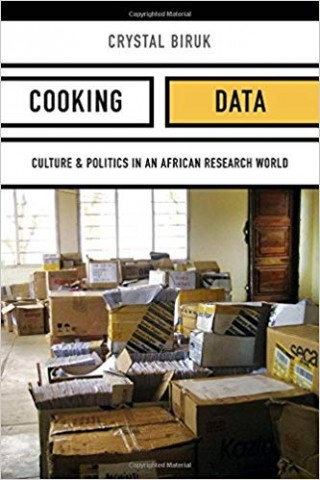Cooking Data
More attention is being paid to data. In the context of the SDGs, it is the lack of data. In the broader conversation, it is about the quality of data. From these conversations, there is an emerging literature that might might classify as an ethnography of data. A recent addition to this set of literature is is Crystal Biruk's "Cooking Data: Culture & Politics in an African Research World" (2018). The book focuses on heath data in Malawi, but offers insight well beyond. The following are some key points that stood out:
- "While we tend to think of data as abstract and intangible, these vivid descriptors draw attention to to their materiality and life course. Numbers, of course, come from somewhere. A careful consideration of the social lives of numbers, rather than viewing them as stable and objective measures of reality, provides crucial context for interpreting quantitative evidence that we often deem too big or too technical to wrap our heads around. As an ethnography of the production of quantitative data, this book encourages its readers to be a little bit less in awe of numbers by understanding them as "creatures that threaten to become corrupted, lost, or meaningless if not properly cared for" (Ribes and Jackson, 2013, 147). It also considers how the activities of data collection not only produce numbers but shape personhood, sociality, and truth claims." (p. 3-4)
- "Along the way, I learned, as well, that my critical gaze was shared by the people I was studying: some demographers , too, are well aware of the shortcomings of their numbers, but keep making for the sake of policy, journal articles, and a faint sense that they might somehow improve the lives of rural Malawians." (p. 17)
- "Rather than dismissing numbers as simply false, socially constructed, or inaccurate, the book aims to critically examine the criteria and metrics that help numbers attain their legitimacy and authority by presenting a fine-grained account of data's life course and handling by many diverse actors." (p. 26)
- "In Malawi at the time of my research, the National Health Sciences Research
Council (NHSRC) and the College of Medicine Research and Ethics Committee (COMREC) —both local ethics boards discussed in further detail in
chapter 3—mandated that research proposals submitted for local review
by foreign researchers list a Malawian coprincipal investigator and include
a detailed letter of affiliation to a local institution. Research guidelines also
provided clear instructions to guide coauthorship of articles produced by
research. The contract for collaboration between foreign and Malawian researchers has a wider sweep whereby benefits or resources also flow to the institution where the latter is based. The acting head of the National Research
Council of Malawi explained that national review boards were increasingly
vigilant about ensuring that proposals submitted by foreign projects put in
place solid plans for genuine collaboration; for example, Dr. Jones described
how MAYP's initial proposal did not pass review because NHSRC claimed that
the institutional collaboration between the American team and a Malawian
university was "not meaningful."" (p. 39)
- "expectations that people should participate in research altruistically or for the public good are in tension with research fatigue, a legacy of exploitation and unfulfilled promises at the hands of global projects, and therapeutic misconception, in which research participants mistakenly attribute therapeutic intent to research procedures...Rather than the cog in the assembly-line machinery of research that demographers imagine soap to be, then, this ethical gift unravels normative ethics and highlights how collecting high-quality data is less a clean assembly-line process than a messy and unpredictable life course." (101-102)
- "Research participants employed the metaphor of hunger to accuse Malawian fieldworkers of "eating [their] money": "They come here and instead of fetching food for the children, we sit here wasting time kucheza [talking].... They go home and eat good food, rice, meat.... They leave me hungry and make money as they do so."" (p. 116)
- ""We can't add a code without messing up things in terms of the past, data we have already collected. We must keep the phrasing and translation of the questions consistent, even if they aren't the most accurate. It's too late-In order to measure change, we have to ask things in the same exact way. We have to have the same codes every wave even if they're not correct. So, just fit those responses [i.e., those mentioned above] into the existing categories." (p. 144)
- "thirty years after Justice (1980) provided anthropologists concrete suggestions for presenting their findings more effectively to planners, we continue to fail by others' and our own standards: our work has not really revolutionized medicine, global health, or development. In fact, by these metrics, the critical development studies and medical anthropology literature—much of which has, since the 1990s, documented how grand projects fail—is also an archive of anthropologists' own continued failure to be useful in the strong sense we may aspire to." (p. 210)
Featured Posts
Tags
Politics
Interdisciplinary
Culture
Development
Resilience
Agriculture
Climate change
Middle East
Fellowship
Policy
Gender
Racism
Power
Participation
Anthropology
Poverty
History
Land
Education
Sustainability
Post-doc
Migration
Capitalism
Inequality
Islam
Economics
Ethiopia
Colonization
Governance
International development
Human Rights
Qatar
Ideology
decolonization
South Africa
Civil society
Leadership
Books
Rural Development
Colonialism
Democracy
Revolution
Institutions
Development Studies
Ethnography
Conflict
Africa
Food Security
Globalization
Ethics

